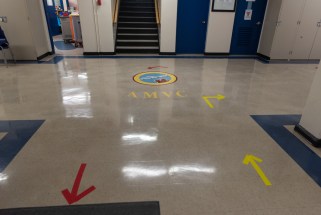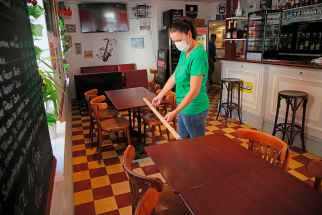Restaurant sector requires code-red support
Read this article for free:
or
Already have an account? Log in here »
To continue reading, please subscribe:
Monthly Digital Subscription
$0 for the first 4 weeks*
- Enjoy unlimited reading on winnipegfreepress.com
- Read the E-Edition, our digital replica newspaper
- Access News Break, our award-winning app
- Play interactive puzzles
*No charge for 4 weeks then price increases to the regular rate of $19.00 plus GST every four weeks. Offer available to new and qualified returning subscribers only. Cancel any time.
Monthly Digital Subscription
$4.75/week*
- Enjoy unlimited reading on winnipegfreepress.com
- Read the E-Edition, our digital replica newspaper
- Access News Break, our award-winning app
- Play interactive puzzles
*Billed as $19 plus GST every four weeks. Cancel any time.
To continue reading, please subscribe:
Add Free Press access to your Brandon Sun subscription for only an additional
$1 for the first 4 weeks*
*Your next subscription payment will increase by $1.00 and you will be charged $16.99 plus GST for four weeks. After four weeks, your payment will increase to $23.99 plus GST every four weeks.
Read unlimited articles for free today:
or
Already have an account? Log in here »
Hey there, time traveller!
This article was published 16/10/2020 (1880 days ago), so information in it may no longer be current.
For Winnipeg to be able to call itself a hub of arts and culture post-pandemic, the extra restrictions served up to restaurants and bars under COVID-19 code orange need to come with a side of financial relief.
On top of previously imposed conditions, licensed establishments in the Winnipeg metropolitan region now face significantly heightened restrictions in the wake of sharply increased COVID-19 caseloads.
A provincially mandated curfew capping alcohol service at 10 p.m. and eat-in dining at 11 p.m. came into effect on Oct. 7, and new measures announced Friday by chief public health officer Dr. Brent Roussin further restrict gathering sizes in restaurants and lounges and shut down bars and casinos completely for at least the next two weeks.
The decision to crack down on late-night imbibing was made to slow the spread of COVID-19 after a number of recent cases were connected to bar-hopping. Given the surging case numbers, there’s no question extra precautions are necessary. However, imposing what amounts to a second shutdown without the province offering sector-specific support is a recipe for disaster.
The province is in a Catch-22 here: it wants to keep restaurants and bars open for the sake of the economy, but it needs to curtail the spread of the virus at bars and restaurants.
Restaurateurs are well-versed in adversity. The industry is famously difficult; those who manage to get enough people in the door to cover the cost of food, labour and rent aren’t guaranteed long-term success. And that’s during “normal times.” The pandemic has upended the business model for places that rely on full tables and high turnover to make ends meet.
Late-night establishments will be hardest hit. Bars and live-music venues make the bulk of their income on cover, ticket and drink sales and, it’s not unusual for a headliner to hit the stage at 10 p.m. or later. Most local venues have only recently started hosting live entertainment again after months of inactivity.
The province held consultations with hospitality groups on the new public-health orders, but so far the plight of the industry appears to have fallen on deaf or disinterested ears.
“The sad part is that we did not receive any feedback from the government whatsoever,” said Shaun Jeffrey, executive director of the Manitoba Restaurant and Foodservices Association.
Save for a few spots that have been fined for failing to enforce social distancing, Winnipeg food and beverage purveyors have been quick to follow public-health orders. Which isn’t surprising, since the health and comfort of customers is a defining priority for the service industry.
The province is in a Catch-22 here: it wants to keep restaurants and bars open for the sake of the economy, but it needs to curtail the spread of the virus at bars and restaurants.
Without support, our favourite places to eat, gather with friends and catch a show could be gone before the pandemic ends.
If the Pallister government needs restaurants and bars to forgo profit to keep the public safe, it should provide adequate, specialized financial support for an industry that, pre-COVID-19, employed more than 44,000 people and was worth more than $2.7 billion, according to Restaurants Canada.
While rent relief, extended wage subsidies and access to working capital would go a long way, the province could also get creative. At the civic level, Coun. Kevin Klein has put forward a proposal to cut property and business taxes for restaurants. If passed by city council, the tax break would be available to any Winnipeg establishment in good financial standing.
Whatever the solution, time is of the essence. Without support, our favourite places to eat, gather with friends and catch a show could be gone before the pandemic ends. Restaurants, bars and music venues aren’t non-essential niceties; they’re part of what makes this city a great place to call home.






.jpg?h=215)

